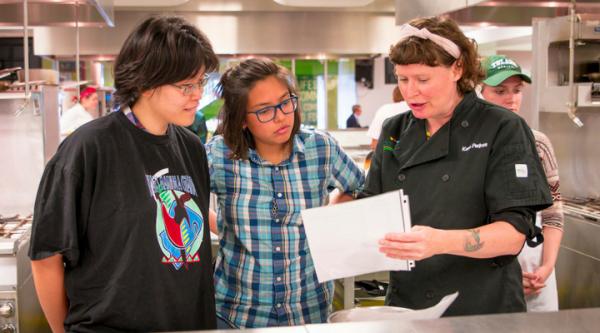April 10, 2017
Interview with Dr. Timothy Harlan, Executive Director of the Goldring Center for Culinary Medicine
The Goldring Center for Culinary Medicine (GCCM) at Tulane University is the first dedicated teaching kitchen to be implemented at a medical school. The center provides hands-on training for medical students through culinary medicine classes in the form of electives and seminars as well as continuing education for the health care and foodservice industries. The center also offers community cooking classes, free and open to the public, that teach practical, evidence-based nutrition, culinary literacy and kitchen confidence.
We chatted with Dr. Harlan about the critical role of diet in health, the motivation to teach health care providers how to cook and the impact the program is having on their students and the community.
Q: Is there an experience you had as a health care professional that emphasized the importance of focusing on obesity prevention/healthy lifestyles?
A: Virtually every single patient visit I have ever had is the answer to that question. For the vast majority of Americans, their diet is at the core of their illness. Illnesses from heart disease, diabetes, and stroke to Alzheimer’s and depression are accelerated by what has become the “standard American diet” or the “Western diet” or the diet of highly processed foods. I was a chef before I became a physician. I’ve been at the corner of food and health for over 30 years now and the truth is that medical students have not traditionally gotten training around diet and nutrition. If we can change the dialogue between doctors and patients around diet, we can lower morbidity and mortality. In other words, it’s just good common sense to do this.
Q: What are the major takeaways of your program?
A: One major takeaway from the program is that we teach everybody from medical students and residents to nursing students and community members. We do this by taking evidenced-based nutrition and Mediterranean diet principles and translating them for the American kitchen. In doing so, we’re helping health professionals translate this knowledge into the conversations they are going to have in the exam room about food. Ultimately, we’re changing the dialogue between a physician and a patient from “Hey, you need to lose some weight” to action-oriented suggestions that meet best practices.
Q: What’s one surprising lesson you’ve learned from this program?
A: The most unexpected lesson I’ve learned is just how important our work with the community is to our medical student programming. We teach the medical students and they teach the community. That process and experience for the medical students in real time makes them the force multiplier in this equation because we can educate so many more people than we would otherwise be able to.
Q: What’s one piece of advice for other healthcare provider training and education programs thinking about doing something similar?
A: Call us!* We’ve invented a pretty good wheel. We now work with 35 sites and partners to implement the program so we have a pretty good understanding of what others’ barriers to entry might be. And if we don’t understand the barriers, there’s a good chance one of our partners will. *Actually, email us — we doctors are easier to reach by email.
Q: What’s your hope for the legacy of the program?
A: My hope for the future is that every single medical and nursing school in America has a teaching kitchen exactly like ours.
The Goldring Center for Culinary Medicine is a winner of the 2017 Innovation Award for Health Care Provider Training and Education. To learn more, visit innovatinghealthcare.org



